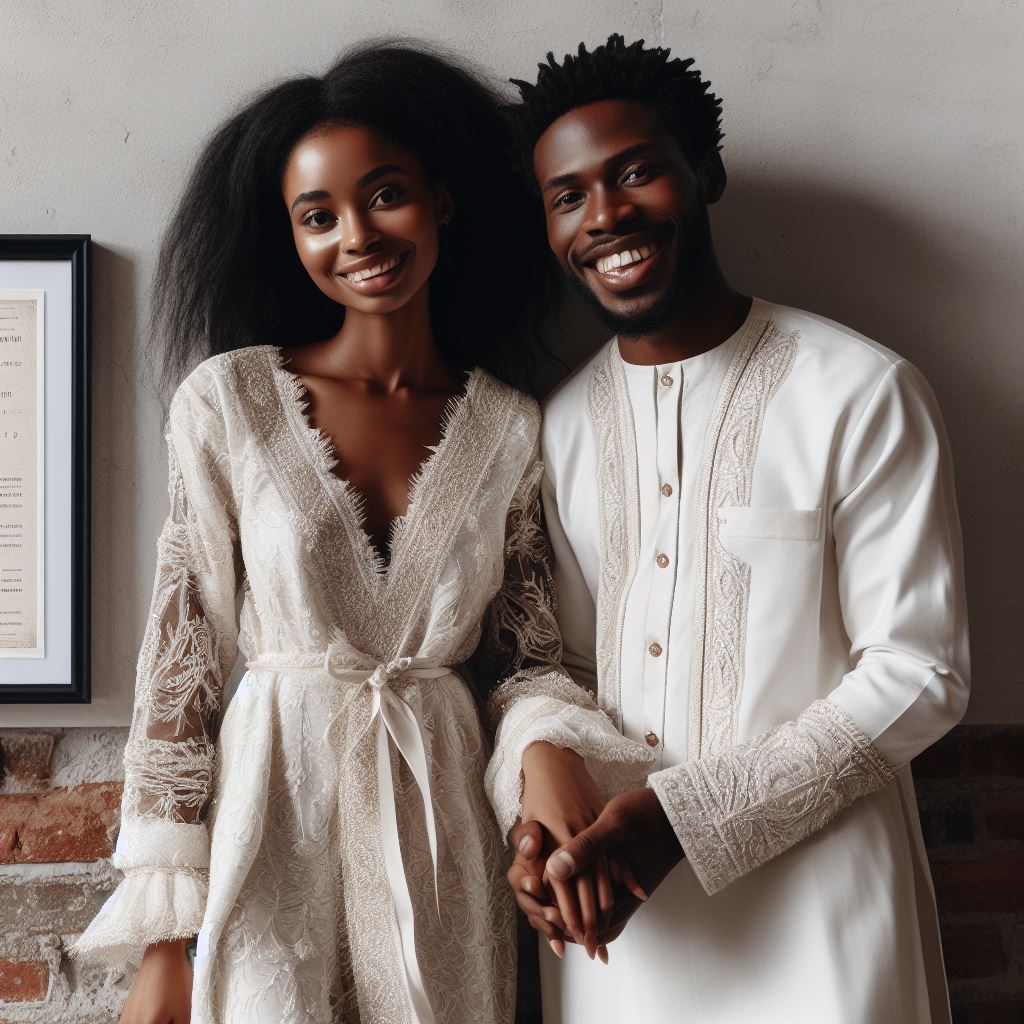The Role of Faith in Strengthening Nigerian Marriages
Last Updated on January 28, 2024
Introduction
Let’s explore the role of faith in strengthening Nigerian marriages.
Nigerian marriages encompass a rich tapestry of diverse traditions, customs, and beliefs that reflect the nation’s cultural heritage.
In this context, faith holds immense significance and acts as a cornerstone in building and strengthening Nigerian marriages.
Faith, be it religious or spiritual, plays a critical role in guiding Nigerian couples through their marital journey, promoting love, harmony, and resilience.
For many Nigerians, faith is deeply intertwined with their cultural identity and serves as a guiding principle in their daily lives.
Whether it is Christianity, Islam, or traditional African religions, faith provides a moral compass for individuals and extends its influence to the institution of marriage.
The strong emphasis on faith in Nigerian culture underscores its pivotal role in shaping marital relationships.
Faith strengthens Nigerian marriages by fostering a sense of commitment and dedication.
Believers draw on their faith to navigate challenges, draw strength from a higher power, and seek guidance in making crucial decisions.
The shared religious or spiritual beliefs between spouses create a sense of unity and solidarity, enabling them to weather storms together.
Moreover, faith in Nigerian marriages often provides a sense of accountability, encouraging couples to live in accordance with their religious teachings and principles.
This accountability promotes mutual respect, love, and understanding between partners, fostering a healthy and thriving marital bond.
In short, faith holds great importance in Nigerian marriages, acting as a vital force in strengthening the marital institution.
Its influence reaches far beyond individual belief systems, shaping the cultural fabric of the nation.
The role of faith in Nigerian marriages solidifies the bond between couples, offering guidance, resilience, and a strong foundation upon which love and commitment can flourish.
The Influence of Religion on Nigerian Marriages
Dominance of Christianity and Islam in Nigeria
- Nigeria is predominantly embraced by two major religions, Christianity and Islam.
- Christianity is practiced by the majority of Nigerians, accounting for around 50% of the population.
- Islam is the second-largest religion in Nigeria, with approximately 45% of the population being Muslims.
- These two religious faiths play a significant role in shaping Nigerian marriages.
How religious beliefs impact marital values and expectations
- Religious beliefs form the foundation of Nigerian marriages and heavily influence marital values and expectations.
- Christianity promotes virtues such as forgiveness, love, fidelity, and commitment, which are vital in marriage.
- Islam also emphasizes similar values, including trust, respect, communication, and companionship.
- These shared values strengthen the bond between spouses and contribute to successful and fulfilling marriages.
Role of religious leaders in marriage counseling and guidance
- Religious leaders, both Christian and Islamic, provide essential guidance and counseling for married couples.
- They serve as mediators, helping couples navigate challenges and conflicts within their marriages.
- Pastors and priests offer pre-marital counseling to prepare couples for the journey ahead.
- Imams also play a significant role in advising couples on proper Islamic practices and resolutions.
- Religious leaders help couples deepen their faith and inspire them to prioritize their marriage commitment.
In fact, the influence of faith on Nigerian marriages is profound, considering the dominance of Christianity and Islam in the country.
These religions shape the values and expectations within marriages, promoting virtues like love, trust, and fidelity.
Additionally, religious leaders provide guidance, counseling, and support to couples, strengthening their commitment to each other and their faith.
Faith-Based Values and Principles
Importance of commitment and fidelity in Nigerian marriages
- In Nigerian marriages, faith-based values and principles play a significant role in strengthening the relationship between spouses.
- The importance of commitment and fidelity is deeply ingrained in the Nigerian culture.
- Couples understand that marriage is a lifelong commitment, and they strive to honor this commitment by staying loyal and faithful to their spouse.
- The belief that marriage is a sacred bond encourages them to prioritize their relationship above all else.
Emphasis on mutual respect and acceptance
- Mutual respect and acceptance are also emphasized in Nigerian marriages.
- Faith teaches couples to treat each other with dignity and honor, valuing their spouse’s opinions and feelings.
- Open communication is promoted, enabling spouses to express themselves freely and be heard.
- Nigerian couples believe that their faith calls them to love and accept each other as God’s creation, embracing their differences and celebrating the unique qualities they bring into the marriage.
Promoting forgiveness and reconciliation in marital conflicts
- Furthermore, faith promotes forgiveness and reconciliation in marital conflicts.
- Couples are encouraged to forgive each other and seek reconciliation when disagreements arise.
- They understand that forgiveness is not a sign of weakness but a powerful tool for healing and restoring their relationship.
- The belief in the power of redemption and grace helps Nigerian couples overcome their differences and grow closer together.
In essence, Nigerian marriages benefit greatly from the faith-based values and principles they uphold.
The emphasis on commitment and fidelity ensures that couples prioritize their marriage and remain faithful to their spouse.
Mutual respect and acceptance create a nurturing environment where couples can communicate openly and appreciate each other’s uniqueness.
With a focus on forgiveness and reconciliation, Nigerian couples can overcome conflicts and strengthen their bond.
Read: Foundations of a Godly Marriage: Biblical Insights
Faith as a Source of Emotional Support
Embracing faith as a source of emotional support, guidance, and shared spiritual practices strengthens Nigerian marriages.
During challenging times, having faith provides solace and comfort, enabling couples to weather the storms together.
Believing in a higher power encourages spouses to seek divine guidance for their marital challenges.
This reliance on God’s wisdom fosters humility and relieves the burden of finding solutions solely on their own.
Additionally, shared spiritual practices deepen the bond between partners, creating a sense of unity and reinforcing their common values.
Providing solace and comfort during challenging times
- In moments of distress, faith serves as an anchor that offers comfort and reassurance.
- Couples who share a religious belief system find solace in knowing that there is a greater plan at work in their lives.
- Praying together not only brings emotional healing but also strengthens the bond between spouses.
- It is through the act of prayer that couples can express their deepest fears, hopes, and desires, creating a profound sense of intimacy.
Encouraging spouses to seek divine guidance for marital challenges
- Faith also encourages couples to seek divine guidance for their marital challenges.
- Nigerian couples who believe in a higher power are more inclined to turn to prayer as a means of finding solutions.
- They trust that through surrendering their struggles to God, they will receive the guidance and wisdom needed to overcome their obstacles.
- This reliance on divine intervention fosters humility within the marriage, fostering an environment where couples are open to seeking help and advice from others.
Strengthening the bond between spouses through shared spiritual practices
- Furthermore, engaging in shared spiritual practices strengthens the bond between partners.
- Whether it is attending religious services together, reciting scriptures, or participating in religious rituals, these activities deepen the emotional connection between spouses.
- By actively engaging in their faith as a couple, they reinforce their common values and beliefs, enhancing their unity.
In general, faith plays a crucial role in strengthening Nigerian marriages.
It provides solace and comfort during challenging times, encourages spouses to seek divine guidance, and strengthens the bond through shared spiritual practices.
Embracing and nurturing faith within a marriage can lead to emotional support, growth, and a deeper sense of connection between partners.
Read: Invitation Card Mistakes Nigerian Couples Should Avoid

Role of Faith Communities in Nigerian Marriages
Influence of religious gatherings on marital relationships
- Attending religious gatherings can have a significant impact on strengthening Nigerian marriages.
- Religious teachings often emphasize the value of commitment, loyalty, and forgiveness in relationships.
- Listening to sermons about marriage can inspire couples to work on their relationship.
- Religious gatherings provide a platform for couples to reflect on their marriage and seek divine intervention.
- By participating in worship services together, couples can strengthen their spiritual bond and unity.
Importance of participation in faith-based events as a couple
- Participating in events such as marriage conferences, retreats, and seminars can enhance the marriage bond.
- These events provide opportunities for couples to learn from experienced speakers and experts.
- Couples can gain valuable insights into effective communication, conflict resolution, and other key aspects of marriage.
- Faith-based events often offer practical tools and strategies to help couples maintain a strong and healthy marriage.
- Attending these events together fosters a sense of togetherness and shared commitment towards the marriage.
Support and accountability from fellow believers in preserving marriages
- Faith communities in Nigeria are known for providing a strong support system to couples.
- Believers can offer guidance, encouragement, and prayers to couples facing challenges in their marriages.
- Members within the faith community can act as mentors, providing wisdom and advice based on their own experiences.
- Sharing struggles and triumphs with fellow believers creates a sense of vulnerability and bonds of trust.
- Accountability within faith communities can help couples stay committed and strive for a strong and enduring marriage.
In review, the role of faith communities in strengthening Nigerian marriages cannot be underestimated.
Religious gatherings have the power to inspire, uplift, and guide couples in their marital journey.
Participating in faith-based events as a couple opens doors for learning, growth, and enrichment.
The support and accountability from fellow believers provide a solid foundation for preserving marriages.
By actively engaging with their faith community, couples can cultivate a thriving and fulfilling marriage.
Read: Why RSVP Matters: Making the Most of Your Wedding Card
Faith-Based Resources and Practices for Strengthening Marriages
Pre-marital counseling and marriage preparation programs
Pre-marital counseling and marriage preparation programs play a vital role in strengthening Nigerian marriages.
Couples can seek guidance from religious leaders or trained counselors who utilize faith-based principles and teachings to help them navigate the challenges that may arise in their marriage.
These programs often focus on effective communication, conflict resolution, and understanding each other’s needs and expectations.
Utilizing scriptures and religious teachings for marital guidance
In Nigerian marriages, faith-based resources such as scriptures and religious teachings provide a solid foundation for marital guidance.
Couples can turn to their religious texts for wisdom, advice, and guidance on how to build a strong and healthy relationship.
These teachings often emphasize the importance of love, commitment, forgiveness, and respect within the marriage.
Engagement in prayer, meditation, and spiritual rituals as a couple
Engaging in prayer, meditation, and spiritual rituals as a couple can significantly strengthen Nigerian marriages.
These practices allow couples to deepen their spiritual connection and seek divine guidance and support.
Through joint prayer and meditation, couples can find solace, peace, and a sense of unity, which helps them navigate the ups and downs of married life.
Faith-based resources and practices are powerful tools in strengthening Nigerian marriages.
Pre-marital counseling and marriage preparation programs provide invaluable guidance, scriptures and religious teachings offer wisdom and guidance, and engagement in prayer, meditation, and spiritual rituals foster a deep spiritual connection.
By incorporating these faith-based elements into their relationship, Nigerian couples can create a strong and lasting marital bond.
Read: Tips for Selecting the Right Envelope for Your Invite
Discover More: Biblical Love Stories: From Ruth and Boaz to Mary and Joseph
Challenges and Solutions in Applying Faith to Marriages in Nigeria
Unique cultural and religious challenges faced by Nigerian couples
In Nigerian marriages, couples often encounter challenges rooted in their diverse cultural and religious backgrounds.
These challenges might include conflicting traditions, beliefs, and expectations.
Importance of open communication and compromise in interfaith marriages
For interfaith marriages, open communication and compromise play a vital role in strengthening the marital bond.
Both partners should actively listen, respect each other’s beliefs, and find common ground.
Seeking guidance from religious leaders for resolving conflicts
In times of conflict, seeking guidance from religious leaders can provide a valuable perspective.
These leaders can offer advice based on religious teachings and help couples navigate challenging situations in accordance with their faith.
Conclusion
Throughout this blog section, we have explored the significant role that faith plays in strengthening Nigerian marriages.
From the beginning stages of courtship to the challenges faced in the marital journey, faith provides a solid foundation that can withstand any storm.
We have seen how faith-based resources and practices, such as attending religious ceremonies together, seeking guidance from religious leaders, and engaging in prayer and meditation, contribute to the growth and longevity of Nigerian marriages.
By utilizing these faith-based resources and practices, couples are able to develop a deeper understanding and connection with one another.
They are able to navigate the ups and downs of marriage with grace and resilience, knowing that they are not alone in their journey.
The vital role of faith in the success of Nigerian marriages cannot be overstated.
It provides couples with a strong sense of purpose, shared values, and a belief in something greater than themselves.
It brings them closer together, strengthens their commitment, and empowers them to overcome any obstacles that come their way.
So, whether through attending religious services, reading scriptures together, or relying on prayer and meditation, Nigerian couples can find solace, guidance, and strength in their faith.
By embracing the role of faith in their marriages, they can build a foundation that will withstand the test of time.


